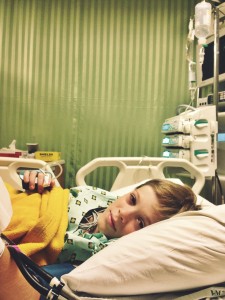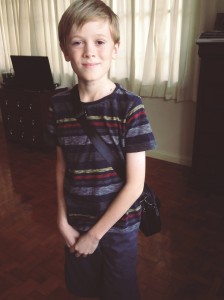April 18, 2014
Dear friends and family,
It has been a very, very long stretch since my last blog post. I have come to the empty page again and again and found myself unable or unready to put words to the last few months. It has felt too heavy, and surprisingly, an emotion of embarrassment accompanies the weight. I am not sure how to unload this latest chapter without being burdensome, and though two months have passed, it still feels awkward to peel back the layers to reveal something so fresh and incoherent. So, forgive me as I fumble through.
First, the facts. On February 14, 2014, Valentine’s Day, as we all sat around the table eating our dinner, I received a call from our pediatrician. I had taken Jude in for a consultation two days before. He was peeing several times in the night, and his already slim frame had grown more skeletal, the bumps of his spine sharply popping up from the plains of his back. He had been slightly more emotional lately, a little bit less focussed in school. Something seemed amiss, but as we sat in her office, Jude was bright and positive. She ordered tests with efficiency but without urgency. On Valentine’s Day, two days later, however, she spoke with conviction. Could we please take Jude to the ER for further testing? There was glucose in his urine. He might have diabetes. And with a further move into the surreal: if the glucose in his blood read over 200, they might have to admit him to the hospital immediately.
We quickly wrapped up dinner and Jude and I rode off into the night, chatting amicably about this and that. He said he felt fine. I prayed that his number would be under 200 so we could go home. When they checked his blood levels, however, the machine could not give a number. Apparently, his glucose level was off the charts. Where there should have been numbers, the monitor flashed the words, “critically high”. With further tests they would pin down the math: 700. The pediatric endocrinologist who had already arrived home for the evening came back to the hospital. After looking at his charts she recommended that Jude be admitted to the ICU instead of a normal hospital room. It was that simple. One minute we were having dinner and the next minute my son was admitted to the hospital with a lifelong diagnosis of type 1 juvenile onset diabetes.
Type 1 diabetes is not what you might think. It does not run in our family, nor is it hastened on by a poor diet, high in sugar and carbohydrates. Rather, it is an autoimmune disease. They do not know why, exactly, the body attacks the pancreas, destroying the beta cells which produce the insulin your cells need to absorb glucose. The result, however, is certain: full insulin dependency for life. In other words, in order to translate food into energy effectively, Jude needs to carefully calculate his insulin needs throughout the day and receive the necessary insulin through injections or an insulin pump. Because type 1 diabetes destroys all of the insulin producing beta cells, Jude’s diabetes cannot be “controlled” by diet, as is common with type 2 diabetes. Only 5% of all cases of diabetes are type 1 diabetes.
Jude remained in the hospital for five days as we learned together the complex knowledge and treatment required to keep him alive. During that first month at home, I was reminded of Jude’s infancy, when my whole being was bent over his fragile frame and all my energy was poured into nurturing and sustaining it. We moved a mattress into our room, and my ten year old boy slept there. Once again, I listened for his breathing in the night, feeling watchful. Once again, I wakened in the darkness, this time not to feed him but rather to check his blood sugar levels. It was hard to get back to sleep after the needles and blood and poking. I would toss and turn, new facts and numbers swimming in my head.
Of course, we learned. We adjusted. We acquired the necessary tools, the books, the recipes. Jude is now permanently attached to his little black bag. He checks it daily to make sure he has the right supply of alcohol swabs, needles, cotton balls, etc. He checks his own blood six to eight times a day without complaint, and can give himself injections when we are not there. After a week of quietly shadowing him at school, he is now self-sufficient, texting me with hearts and smiley faces or comic alarmed looks when he is high, low or just right. I have become adept at needles, and Jude cheerfully reports after each shot on whether or not it stung and how well I did in making it as painless as possible. Steve has become an equally capable nurse.
Inevitably, when I share Jude’s diagnosis, people tell me of an aunt or a cousin or a friend who has type 1 diabetes and lives a full and perfectly healthy life. They are right. Though there are real risks, of lows that produce diabetic comas and death or of highs that produce nerve damage, blindness, heart disease and kidney failure, the truth is that if he manages it well, Jude will live a largely normal life. But underneath the surface, there is much about his life that is not normal. The constant calculations over every bit of food taken in, the childhood treats largely forgone (ice cream when the weather is hot and candy at the movies), and of course, the ubiquitous needles. It is the constant discipline of the thing that distinguishes itself from a normal, carefree life. Type 1 diabetics are good at handling this privately. They adeptly manage the supplies, the equipment, the constant calculations and the poking with a smile. My ten year old is already an expert, not only in his care but in his attitude. But as his mother, I count the cost and gather up the shards of freedom left in the aftermath of the disease. To do anything less would be to miss the courage and responsibility Jude exhibits daily.
A few brave friends looked our situation in the face, and with voices thick with tears, said, “Too much.” I was grateful for the absence of placation and appeasement, that allowed it to be a very bad thing that had happened to our son. We rise and smile so that it is not too much, especially for others, especially for him. But behind the capability and the making the most of things, this, like so many other things, is not the way it should be. Just as no child should hunger or thirst or suffer neglect, no child should be poked and prodded throughout their day. No child should worry about every bit of food that passes their lips. No child should be woken in the night to make sure they are not dangerously low. I should not know the ICU nurses so well. While we are going to be okay, and while Jude will be able to do many things in life, it is also all right to acknowledge that this is not, actually, okay.
Today is Good Friday. In Manila, the stores are closed, the city hushed, the traffic scarce. Last night, as we ended our Maundy Thursday service, the lights dimmed and Steve ripped the covering off of the altar and left it messy on the floor. He limped from the sanctuary. We processed out in darkness and silence. I am glad for a God that does not turn away from suffering. I am grateful that he wept in the garden on the night he was betrayed. I am grateful that he wanted friends to stay awake with him and pray. They did not. I am grateful that he still considered them friends.
It is sometimes considered a sick thing that as Christians we remember our Savior through blood and a broken body, that we gather to worship around a Roman torture instrument, the cross. But if I am honest about my own brokenness, and as I look out upon a world that suffers far more than I could ever know, I am grateful for the language of suffering that is so central to our faith. His sacrifice was costly. Today we turn and look that cost in the face: the beatings, the mockery, the crown of thorns, and yes, the Roman instrument of torture, the cross. We cannot weigh the spiritual suffering, the heaviness of our sin and shame, the separation from the Father, that drove the pain still deeper. But we can honor it by acknowledging it, by looking it in the face with whatever courage we can muster.
It is deeply troubling, as it should be. His suffering is troubling. Our sin is troubling. The suffering that abounds in the world is troubling. But as we shift our gaze from the suffering itself to the love that caused him to willingly hang there, it is also heartrendingly beautiful. We see him extending grace to an undeserving thief. We see him forgiving us even as we did the harmful deed. We suffer because we must. He suffered because he loved. The love has a transformative effect. The sweetness mingles with the bitter, just as love mingles with our sin, and shifts what is true. The cross becomes not only an instrument of torture but the instrument of our redemption. The curtain is forever torn asunder. We enter in.
On Easter Sunday we will adorn our cross with flowers. We will celebrate the resurrection with joy. But in the center of the sanctuary, the cross will remain. The victory is precious because of the cost. Our Savior knows it well. And when we suffer, we know it too.
Lest we forget, on the day of his resurrection, he appeared to his friends with holes in his hands. When one man doubted, he came to him, eight days later, and invited him to touch the wounds. The God who heals chooses to identify himself by his suffering. The scars are allowed to remain. He is not ashamed.
The suffering is part of the redemption. We cannot ignore it, not in our own lives, and not in the life of the God we follow. Love is most beautiful and most meaningful when it costs us something. I love Jude more, with every midnight waking and with every needle prick. My love is made real with the price I pay. Today is Good Friday. Today, I will follow him to the foot of the cross. There he will pay the ultimate price. And his love will change everything.


